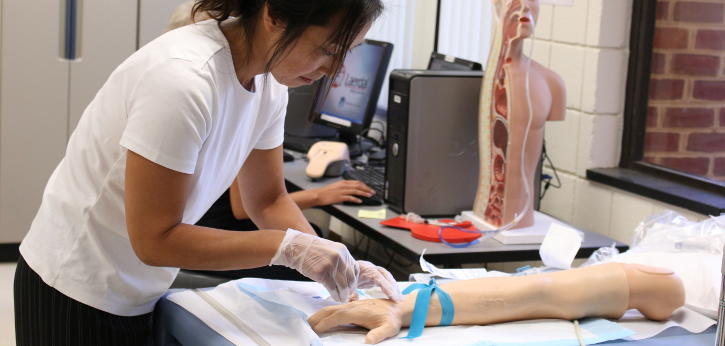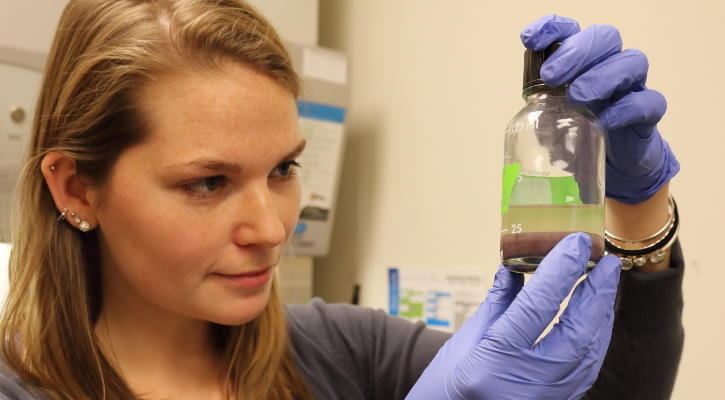Health Informatics
The Health Informatics Learning Lab
The Health Informatics Learning Lab (HILL) is a dedicated lab and teaching space intended for research and collaboration for informatics students, researchers and faculty. The lab provides unique playground for informatics for students for their in-class and out-of-class projects and is located in Peterson Family Health Sciences Hall – the new home of the health informatics program.
The Machine Learning and Inference Laboratory
The Machine Learning and Inference Laboratory (MLI) focuses on developing machine learning methods specifically designed to work with complex data found in medical, health care, and health applications in order to produce human-oriented results. Simply speaking, machine learning is about enabling intelligent systems to perform tasks that are too complex to be programmed. MLI is one of the longest existing labs focused on machine learning with history dating back to the early 1970s.

Our simulation lab is home to a variety of simulated (mannequin) patients ranging in age from infant to adult, male and female, and a pregnant mannequin that can deliver her baby.
Nursing
Simulation Lab
The Simulation Laboratory is an intricate part of student learning. It provides a foundation for critical reasoning, synthesis, and analysis of increasingly complex care scenarios. It is one of the School of Nursing’s most innovative features. The lab has hospital bed stations and exam areas, a birthing and pediatrics simulation area, a mock nurse’s station, and medication room. There are four video cameras per patient bed for performance recording and review during a debriefing period. It is here that George Mason’s nursing students can expand their knowledge and training by participating in administering health care in a hospital, before, and along with, their clinical experiences.
Our simulation lab is home to a variety of simulated (mannequin) patients ranging in age from infant to adult, male and female, and a pregnant mannequin that can deliver her baby. All of the mannequins, from low to high fidelity, have names, personal histories, and life-like features such as a palpable pulses, voices, blinking eyes, and a rising and falling chest to simulate breathing. These mannequins can be manipulated, using a computer and compressed air, to have physiologically accurate responses to the care provided by students. Additional equipment, such as IV pumps, EKG monitors, respiratory equipment, wound care equipment, an automated medication dispensing machine, and crash carts, add to the reality of the learning space. There also exists the ability to perform moulage, which gives select patients the ability to appear “more real.”
To facilitate the simulated learning environment, the Simulation Lab has an observation/control room with computers for every mannequin and two one-way mirrors that allow faculty to direct and evaluate student performance, without being directly involved. This allows the student to develop decision-making, prioritization, and communication skills without the comfort of an instructor. The lab is equipped with state-of-the-art, custom-designed audiovisual equipment used for both formative and evaluative learning. There is also a debriefing room, which is used to conduct reflective discussions and video review, using a Smartboard, following a simulated learning experience. This presents a realistic hospital in a simulated environment—a “Virtual Hospital”—in which students synthesize didactic and clinical knowledge as they transition into professional practice.
Skills Lab
Each skills lab houses a Smartboard, which is used to support and facilitate psychomotor learning. It is the hands-on experience in these labs that George Mason nursing students use to develop competencies in multiple simulated health care settings that cross the human life span.
Work in the Skills Laboratory is integrated throughout the traditional and accelerated Bachelor of Science in Nursing curriculum, beginning with Fundamental Basic Learning and Skills Training, in which students learn basic hygiene, mobility, feeding, and vital physiologic skills, and ending with the more advanced, high acuity physiologic skills. The graduate nursing program accesses the laboratories for the nurse practitioner students to learn and practice essential skills needed for the advanced practice of nursing.

The Nutrition and Food Studies wet lab is a biosafety level 2 lab, providing space for cell culture work and basic food chemistry studies.
Nutrition
Dr. Camille Barry Nutrition Kitchen
The Department of Nutrition and Food Studies' new facilities in Peterson Hall include a state of the art 25 student capacity nutrition teaching kitchen. The kitchen is furnished with multiple food preparation stations allowing students to participate in cooking and other food preparation activities. Each station is equipped with stovetops, counter space, refrigeration, sinks, ovens, and tablets for viewing demonstrations and accessing the internet. The kitchen also provides a large demonstration platform with video recording capability allowing replay for each teaching kitchen station.
Human Nutrition Assessment Lab
The Human Nutrition Assessment Lab was established in 2014 to create a teaching environment and to serve as a resource for clinical research investigations dedicated to human nutrition experimentation. The lab provides an active learning and research environment for students, faculty, and professionals to develop, evaluate and utilize both traditional and cutting-edge nutritional assessment tools among various populations at the local, state, national and international levels.
The lab offers anthropometric, biochemical, and dietary tools to enable complete nutritional analysis. Capabilities include a dual energy X-ray absorptiometry (DXA) densitometer (Horizon A, Hologic) and bioelectric impedance analysis monitor (SC-331S, Tanita), food models (Nasco) and dietary analysis software (Nutritionist Pro, Axxya Systems) as well as a metabolic cart (QuarkRMR, Cosmed) for resting energy expenditure using indirect calorimetry and technical resources for biochemistry analysis. Space is also available for obtaining ethical consent and for conducting surveys and counselling sessions.
Krasnow Institute for Advanced Study Wet Lab
The Nutrition and Food Studies wet lab is located in the Krasnow Institute for Advanced Study on the Fairfax Campus. It is a biosafety level 2 lab, providing space for cell culture work and basic food chemistry studies. The lab’s equipment includes three biosafety cabinets, a CO2 incubator, an inverted light microscope, a multi-mode plate reader, a spectrophotometer, and liquid nitrogen storage of cells. Shared laboratory facilities within the Krasnow Institute for Advanced Study provide the opportunity to perform molecular biology techniques and confocal microscopy. Learn more about the Krasnow Institute for Advanced Study.

Our scientific endeavors are intended to ensure that all individuals are able to achieve the highest possible level of function and a personally meaningful quality of life.
Selected University Resources
Shared Research Instrumentation Facility
The Shared Research Instrumentation Facility (SRIF) provides state-of-the-art, high-tech analytical instruments for conducting applied scientific research in the chemical and biochemical fields. SRIF’s selection of computer-controlled equipment is of the same high caliber as those found in advanced commercial and governmental laboratories. Chromatography equipment for food composition analysis is available through the Shared Research Instrumentation Facility, which is located on Mason’s Science and Technology campus. Learn more about SRIF.
